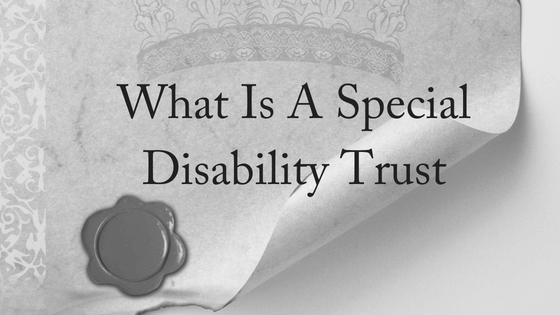A Special Disability Trust is a trust established primarily for succession planning by parents and immediate family members for the current and future care and accommodation needs of a person with a severe disability or medical condition. The general approach is that the trust can pay for any care, accommodation, medical costs and other needs of the beneficiary during their lifetime.
Who can establish a Special Disability Trust?
Anyone can establish a trust for an eligible severely disabled beneficiary. Before a Special Disability Trust is established, the prospective trust beneficiary must be assessed as severely disabled under the legislation for this type of trust.
In general, there are four main roles in establishing a trust:
1. The settlor: The settlor is the person or company who, with the trustee(s), establish the trust by contributing an initial amount (typically $10 is the settled sum) and executing a trust deed. After the trust is set up, assets or cash to purchase assets can then be transferred into the trust.The settlor will often be an accountant, solicitor or a distant family member, who will not have an ongoing role in the operation of the trust. A settlor cannot be a beneficiary, contributor or trustee of the trust. The intention of this provision is to prevent the person who formally sets up the trust from still being seen as the owner of the trust assets and income for tax purposes. To ensure this, the settlor has nothing further to do with the trust.
2. The appointor: An appointor can be any person or corporation who is not the beneficiary or Settlor. The appointor usually indirectly controls the trust and hires (and can dismiss) the trustee(s). An appointor is not responsible for the day-to-day operation of the trust. The trust deed should provide for the future control of the trust after the appointor dies.
3. The trustee: The trustee manages the day to day activities of the trust, conducting business on behalf of the trust, including making investment decisions aimed at increasing the value of the assets. Trustees, among other things, must be fully acquainted with the terms of the trust and their responsibilities, know what the assets and liabilities of the trust are, keep proper accounts and prepare tax returns.
4. The beneficiary: The beneficiary is the person who benefits under the trust. They have no right or claim to any of the trust property until it is vested in them under the terms of the trust. This means that they receive what the Trustee(s) determine is applicable under the trust deed.
What are the main characteristics of a Special Disability Trust?
 A Special Disability Trust must meet the following requirements:
A Special Disability Trust must meet the following requirements:
• have only one beneficiary (that is the person for whom the trust is established),
• the beneficiary must meet all eligibility criteria.
• the primary purpose must be to provide only for the accommodation and care needs of the beneficiary
• have an independent trustee, or alternatively have more than one trustee,
• comply with the investment restrictions,
• provide annual financial statements, and
• conduct independent audits when required
What can a Special Disability Trust pay for?
A Special Disability Trust can pay for all of the beneficiary’s reasonable accommodation and reasonable care expenses.
‘Reasonable accommodation expenses’ may include:
- Payment of rent or the purchase of the primary place of residence of the beneficiary, if the payment is not made to an immediate family member of the beneficiary;
- Modification to the beneficiary’s place of residence arising from his or her disability;
- Maintenance of trust property assets to keep the property in comparable condition, or in a condition that is safe to use (excluding replacement); and
- Fees relating to the accommodation of the beneficiary residing in a residential care service.
The test for ‘reasonable care expenses’ is quite strict: the expense has to be closely tied to the beneficiary’s disability. For example, reasonable care expenses may include a modified vehicle, sleeping and sensory aids and specialised food. All medical and dental expenses (including private health fund membership, ambulance cover, medicines, surgery, and specialist and general practitioner services) are deemed to be reasonable care expenses.
What are the eligibility criteria of the intended beneficiary?
For a special disability trust to be established, the beneficiary must meet the definition of ‘severe disability’ which will be assessed by Centrelink.
Under section 1209M of the Social Security Act 1991 (Cth), a person who has a ‘severe disability’ is:
- A person who has reached 16 years of age:
- whose level of impairment would qualify the person for disability support income
- who has a disability that would, if the person had a sole carer, qualify the carer for Carer Payment or Carer Allowance; and
- who has a disability and is unable to work more than seven hours a week in the open labour market; or
-
- who is living in an institution, hostel or group home where care is provided for people with disabilities and funding is provided under an agreement between the Commonwealth, states and territories; and
- A child under 16 years of age:
- who is a person with a severe disability or a severe medical condition;
- who has a carer who has been given a qualifying rating of ‘intense’ under the Disability Care Load Assessment (Child) Determination for caring for that person; and
- who has had a treating health professional certify in writing that, because of that disability or condition:
- the person will need personal care for six months or more; and
- the personal care is required to be provided by a specified number of persons.
To assess a person’s eligibility for Disability Support Pension, Centrelink usually requires a report from the person’s doctor or specialist about their disability, injury or illness. Centrelink may also require the person to undergo a Job Capacity Assessment (which aims to determine whether the person can work, how much work they can do, and how much help they need in order to find and keep a job).
If you need assistance with establishing a Special Disability Trust, contact us today. We offer a free, 10-minute phone consultation.

